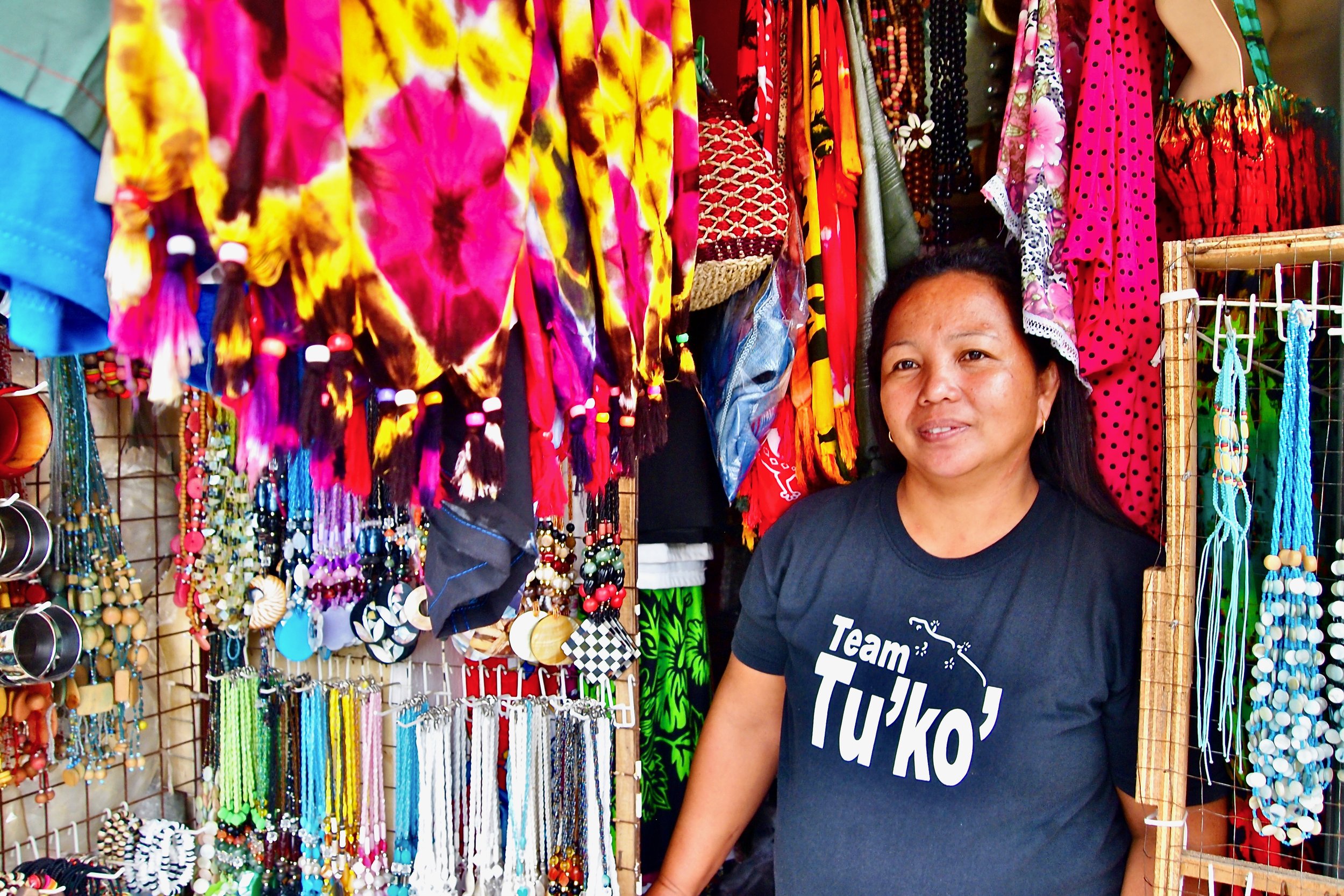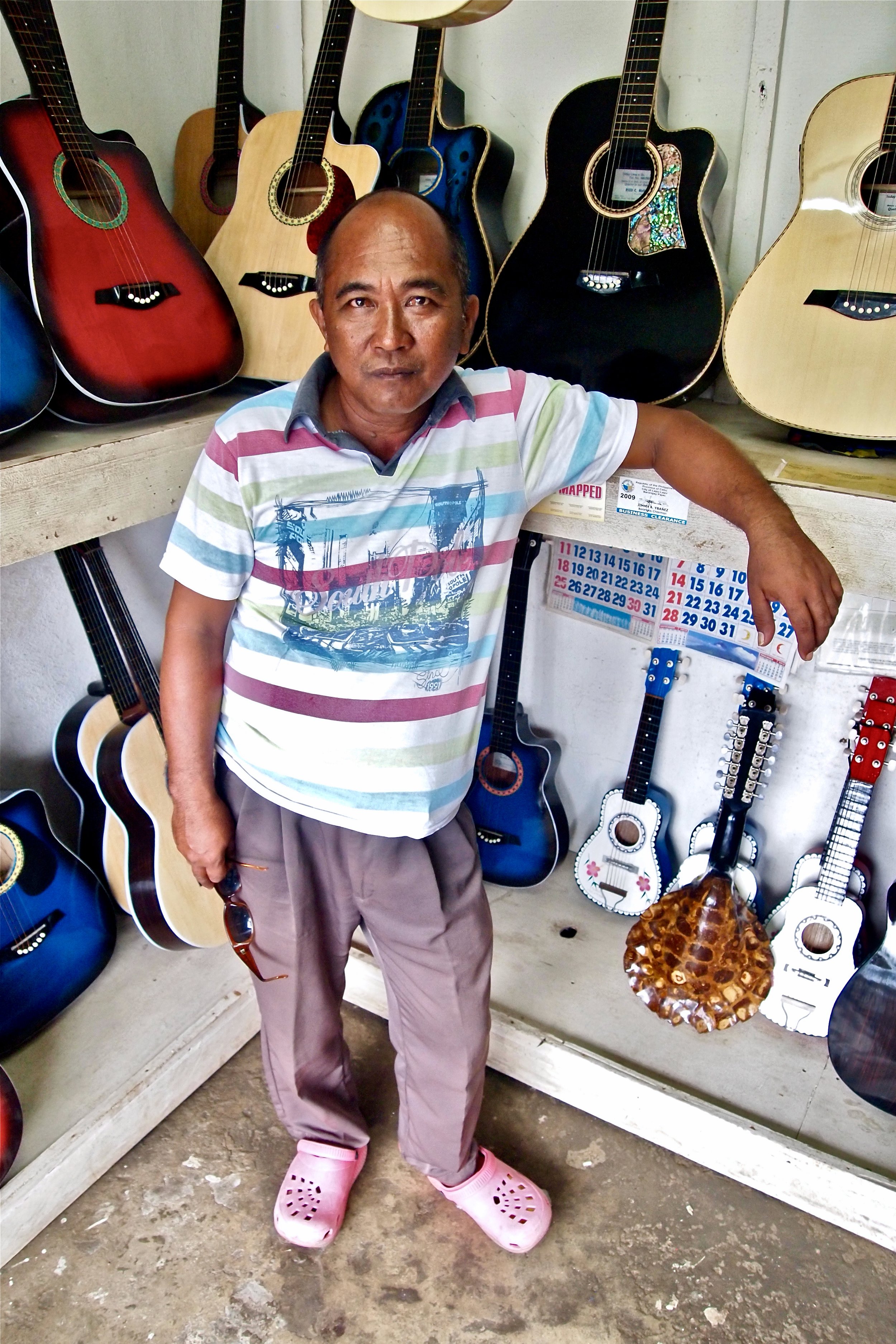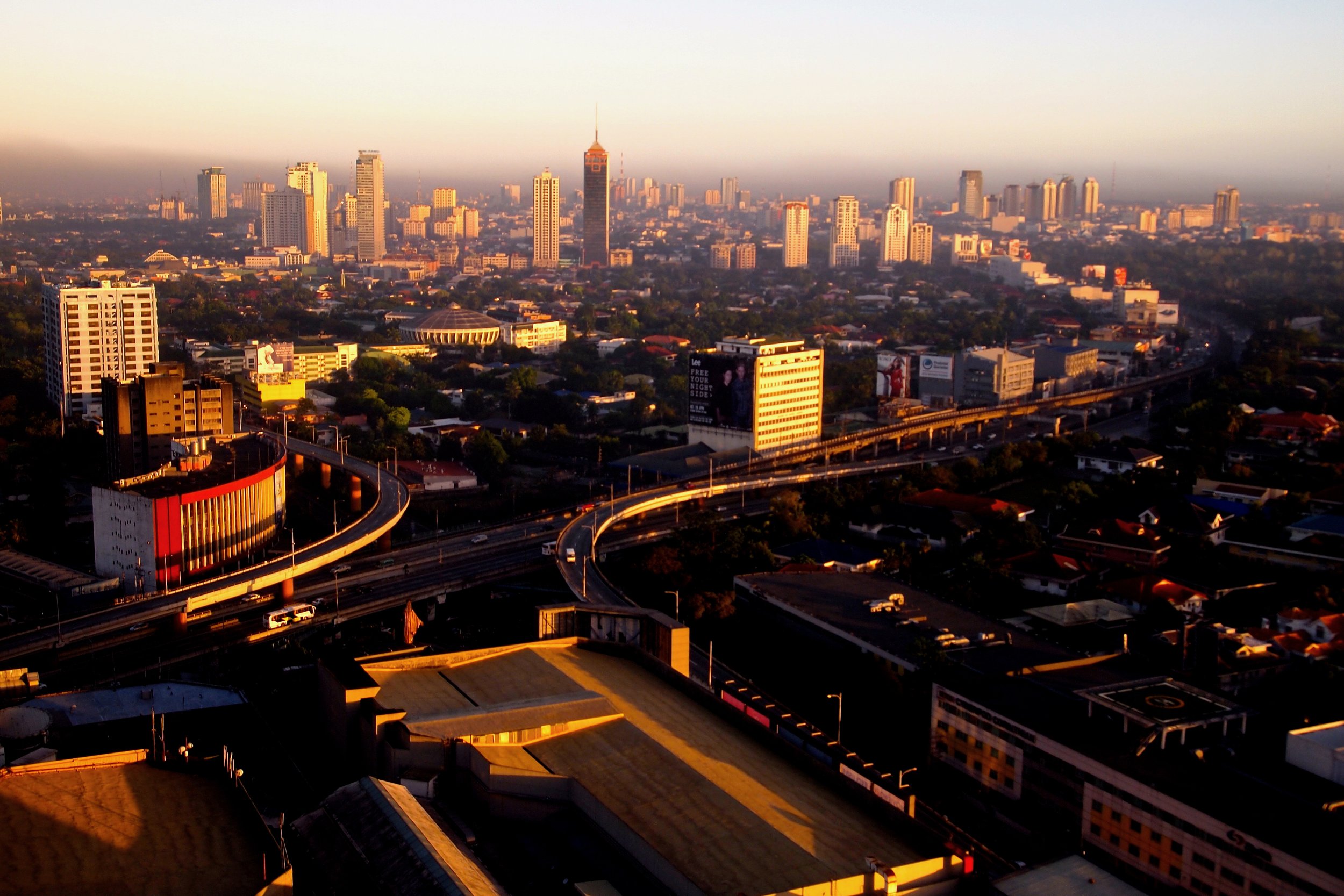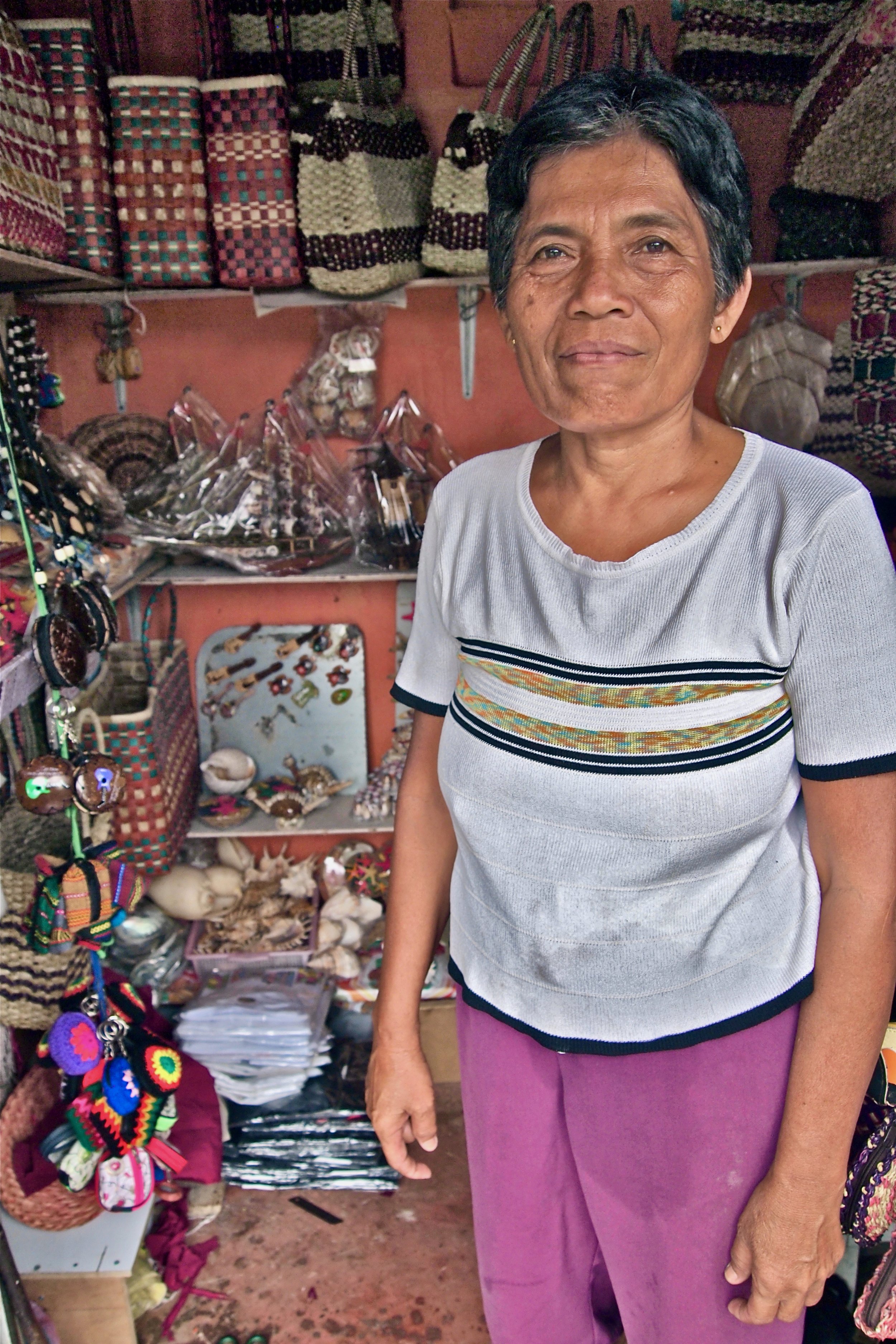
Left Behind
‘It’s more fun in the Philippines’, says the government tourism slogan. But millions are forced to leave the country and work abroad, simply to survive.
Text and Photos: Remko Tanis
Ike Biloy (53) knows better than to ignore the hard truth: if his daughter has the opportunity to never return home, she never will.
He stares out over the parking lot in front of his guitar store in Lapu-Lapu City, a small town in the central Philippines. The lot is wet from rain, his eyes moist from emotions. After a heavy silence, he pulls himself together. “She deserves a better future than this here. To achieve anything, her going abroad is the only option.”
For ten years his now 28-year-old daughter worked at the electronics factory not too far from the guitar shop. “After all that time, she was still not making more than eight thousand pesos a month,” says Biloy. That is about USD 150. “Not even enough to afford her cosmetics.”
Nine months ago, she decided to pack up and leave. She found a new job as sales clerk in a bakery.
In Japan.
Biloy: “It’s far, but it does mean her salary is now high enough for her to send us twelve thousand pesos a month.”
It's money Biloy badly needs. He has twelve children to take care of. “The one in Japan is the oldest. The seven under her are now old enough to start planning going abroad as well. It's a sacrifice we have to make if we want our children to succeed.”

It's more fun in the Philippines. With this catchphrase the country sells itself to tourists abroad. Everything is more fun here! But many of the 105 million people who actually live here have been running for the exits for decades now. Currently, 12 million of them live and work abroad long term.
Emigration flows through the country's veins. ‘Welcome home!’ says a banner near Manila's international airport underneath a photo of a large ship at sea and an agency recruiting crew for these vessels.
In newspapers, online, in the streets: everywhere are ads for jobs in other countries. ‘Waiters, captains, front desk clerks, painters, butchers: over five thousand jobs available worldwide!’ promises the billboard for a job fair.
The website workabroad.ph lists close to 24 thousand job openings: crane operators in Saudi Arabia, maids in Hong Kong, licensor's on Madagascar, nurses in Texas, welders in the Netherlands.
Every day, three thousand Filipino's leave their country for a job abroad.
“It's just that things move so slowly here,” says fishmonger Rico Malingin (48). “Staying here means sacrificing a better future for your family.”
The average day wage is 250 pesos, too little to feed a family. Local medical doctors are actually re-schooling themselves to become nurses, in order to have a better shot at getting a job abroad where nurses earn more on average than a Filipino doctor.
The government boasts the economic growth in the country outpaces that of others in the region. Malingin: “Of course it does. It's because all those Filipinos abroad send money home. They’re the only reason we can buy stuff here.”
In August, a total of 75 billion pesos was transferred to the Philippines from abroad, a year on year growth of 7.6 percent.
The government agency that deals with migrant workers, POEA, expects that growth will continue due the ever increasing demand for Filipino workers overseas.

During the first nine months of this year, POEA processed 231.316 new requests from abroad for Filipino workers. The agency has a database of over a million citizens for whom paperwork has been processed, meaning they can leave for the country for an overseas job in a matter of instants.
While most emigrants from other countries in the region tend to stay in Asia, Filipinos end up all over the world. They are wanted because on average better they’re better educated than citizens of other Southeast Asian nations, and because they understand English.
The Filipino expats end up in a wide range of jobs abroad, on all levels. Careers as foreign nurse, nanny or ship's crew are still the most common. A majority ends up in the Middle East, which was the first region to start hiring from the Philippines over forty years ago.
Helen Ybañez (58) sells souvenirs at the monument that is dedicated to Lapu Lapu, the local hero who killed the Portugese explorer Magellan here in 1521.
Her 35-year-old son has been working as a carpenter in Saudi Arabia since 2010. His wife, who stayed behind to raise their four children aged 12, 10, 9 and 5, recently passed away. It's now up to Ybañez to raise the kids.

“My son graduated high school, but there were simply no jobs here. Leaving is the only viable option, even though this is so very tough for those of us who stay behind. The youngest kid was only 3 when his father was here last. He won't see him again until he's 8.”
She can't fight her tears anymore. “I don't want my son to return, though. If he did, our lives would become only more difficult, because there's no money to be made here. We need cash for the kids to go to school, for us to eat and to have a home. The only reason we currently have these things, is because he's able to transfer 12.000 pesos a month.”
After losing their mother, the four kids want nothing more than for their father to return home Ybañez: “They talk to him on Skype on the weekends. He explained to them that, were he to return, there would be no more money for school for them.”
Once his contract in Saudi Arabia ends, her son hopes to find a job in Canada, because he can bring his family there. Ybañez: “Anywhere but here. I don't see anything positive in our future here. Nothing at all.”
According to the Scalabrini Migration Center, the Filipino government is proud of the high global demand for its citizens.
‘No other country on earth seems so happy to scatter its own population all over the world,’ researchers write in a report. The country even celebrates 18 December as a day to honor all those who emigrated.
Locally, they're known as ‘bagong bayani’, new heroes, because of the sacrifices they make to ensure better lives for their families and the country.

But, the researchers warn, this is only one side of the story. ‘While the government puts on a smile, society blames authorities for being incapable of running the country and creating jobs, forcing so many citizens to leave it.’
The government likes to focus on the billions flowing into the country, helping it to grow, thanks to the hard work of the emigrants abroad.
The Scalabrini Center counters that positivity: ‘A nation's development is always rooted in a country's own policies and projects. There has never been proof that money send home from abroad results in structural progress.’
A few stalls down from Ybañez' souvenir shop sits Elvira Ruiz (40). Her husband has been working abroad for seven years now, first in Qatar and now as quality control manager at a pipeline manufacturer in Saudi Arabia.
“He sends home 40.000 pesos a month and manages to visit each December,” says Ruiz.
When he was still living with her, he worked as a civil engineer. Ruiz: “Not a bad job, but even on that salary we couldn’t live a good life. We lived in a small, dilapidated home. Only recently we could afford a proper house in which I can raise our five children. That's the good that came out of him leaving.”
But maintaining the relationship with a husband who's been living so far a way for so long is difficult. It's a devilish dilemma for millions of Filipinos.
Ruiz: “Especially the first few years were hard. We miss him, but had he stayed, our lives would have been miserable. Now, we can afford to send our 19-year-old to university, after which he too can go abroad. And then all our other children. But only if my husband stays overseas. I'll have to miss him for some time to come.”